Table of Contents
ToggleThe Role of Artificial Intelligence in Everyday Life?
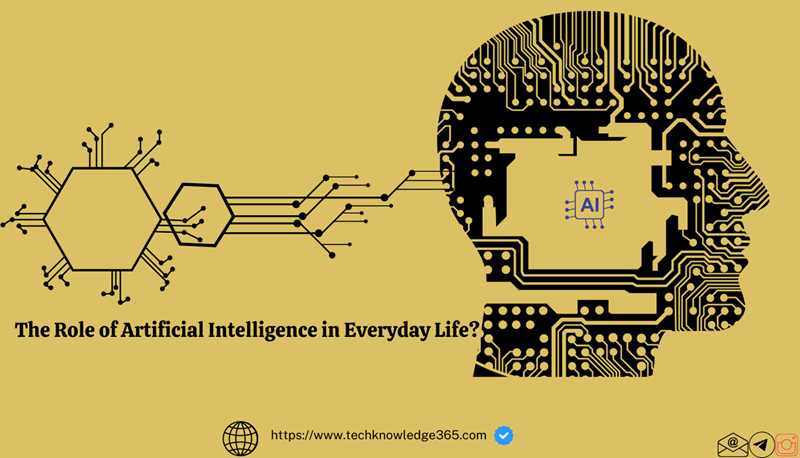
Artificial Intelligence (AI) has evolved from a futuristic concept to a ubiquitous presence in our daily lives. From the moment we wake up to the time we go to bed, AI quietly influences nearly every action we take. Whether it’s through voice assistants like Siri and Alexa, personalized recommendations on Netflix, or even advanced health diagnostics, AI is now woven into the fabric of our daily experiences. In this blog post, we’ll explore the various ways AI is transforming everyday life, and why its role will only continue to grow in the years ahead.
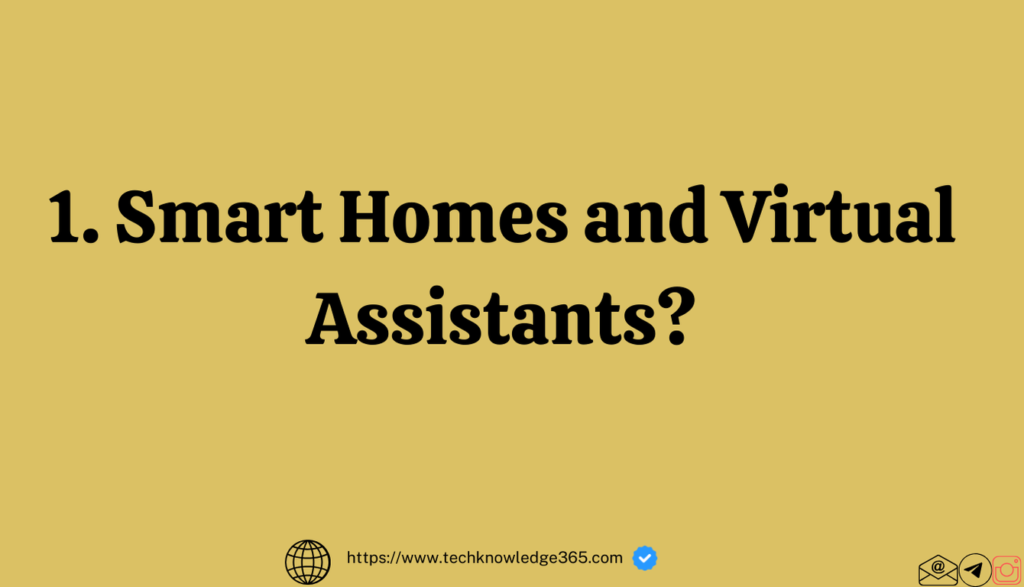
One of the most visible examples of AI’s impact on daily life is through the rise of smart home technology. Virtual assistants such as Amazon’s Alexa, Google Assistant, and Apple’s Siri help us manage tasks effortlessly through voice commands. AI algorithms enable these assistants to understand natural language, making them capable of setting alarms, playing music, controlling smart thermostats, and even ordering groceries.
Smart homes are becoming more intuitive and efficient thanks to AI-powered devices. For example, AI can learn your preferences over time and adjust the temperature of your home to your liking, even before you ask. Lights, blinds, and other appliances can be set to automatically respond to environmental cues, enhancing comfort, energy efficiency, and security.

Online shopping has been revolutionized by AI. Retailers like Amazon and eBay use AI algorithms to recommend products based on a consumer’s browsing history, purchase behavior, and preferences. These recommendations, powered by machine learning, ensure that consumers find relevant items quickly, thus improving the shopping experience.
Moreover, AI has streamlined the entire shopping process, from automated inventory management to customer service. Chatbots, powered by AI, handle customer inquiries and resolve issues without the need for human intervention. This automation helps retailers maintain operational efficiency while providing customers with faster and more personalized service.

AI is making significant strides in the healthcare industry, revolutionizing patient care and medical practices. Machine learning algorithms are increasingly being used to analyze medical data, identify patterns, and make predictions about patients’ health conditions. AI can detect early signs of diseases such as cancer, heart disease, and diabetes, sometimes more accurately than human doctors.
For example, AI-powered diagnostic tools can analyze medical imaging (like X-rays or MRIs) to spot tumors or other abnormalities, reducing the time it takes to diagnose patients. In addition, AI systems are used to recommend personalized treatment plans based on the individual’s unique genetic makeup, lifestyle, and medical history.
Wearable devices, such as fitness trackers, are another area where AI is impacting health. These devices collect data about our daily activity levels, sleep patterns, and even heart rate. AI algorithms analyze this data to provide insights into how we can improve our health and well-being, offering real-time feedback on things like exercise routines and nutrition.
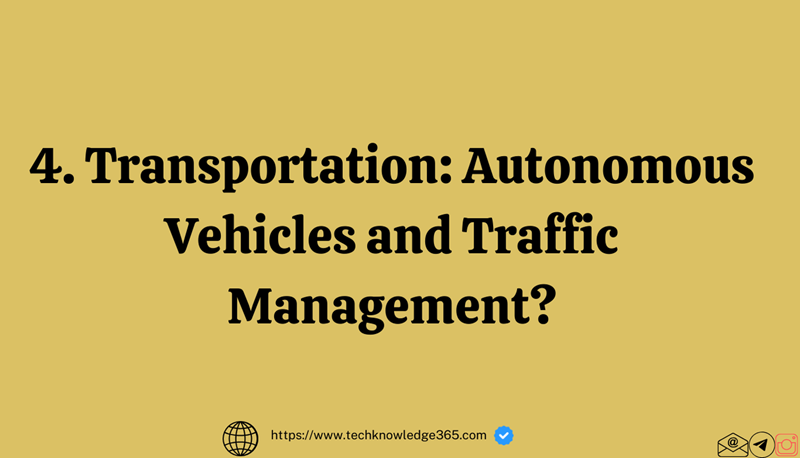
AI is at the core of the development of autonomous vehicles, which could dramatically change how we commute and travel. Self-driving cars, powered by AI algorithms, have the potential to reduce traffic accidents, improve traffic flow, and decrease fuel consumption. By analyzing real-time data from cameras, sensors, and GPS, these vehicles can navigate safely without human intervention.
AI is also making transportation more efficient in cities. Traffic management systems use AI to analyze traffic patterns, predict congestion, and optimize traffic light timings to reduce delays. Ridesharing apps like Uber and Lyft rely on AI to match passengers with nearby drivers, while AI algorithms predict the best routes to minimize travel time and fuel consumption.
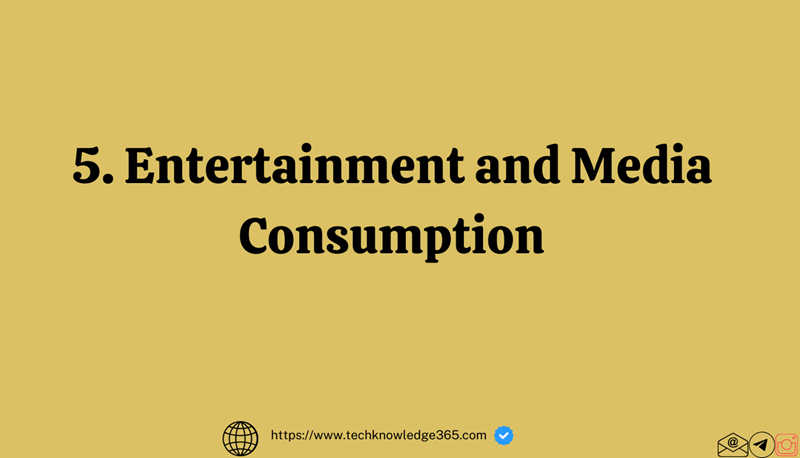
AI plays a significant role in how we consume entertainment, from music to movies and TV shows. Streaming platforms like Netflix, Spotify, and YouTube use AI-powered recommendation systems to suggest content based on users’ viewing or listening habits. These algorithms can predict what we are likely to enjoy, making it easier for us to find new shows, movies, and music without having to sift through endless options.
In addition to content recommendations, AI is used in the creation of media itself. For example, AI is now being used to help scriptwriters, filmmakers, and musicians generate new ideas or even automate parts of the production process. AI-driven tools can analyze trends, predict audience reactions, and even suggest plot twists or character developments, pushing the boundaries of creative storytelling.
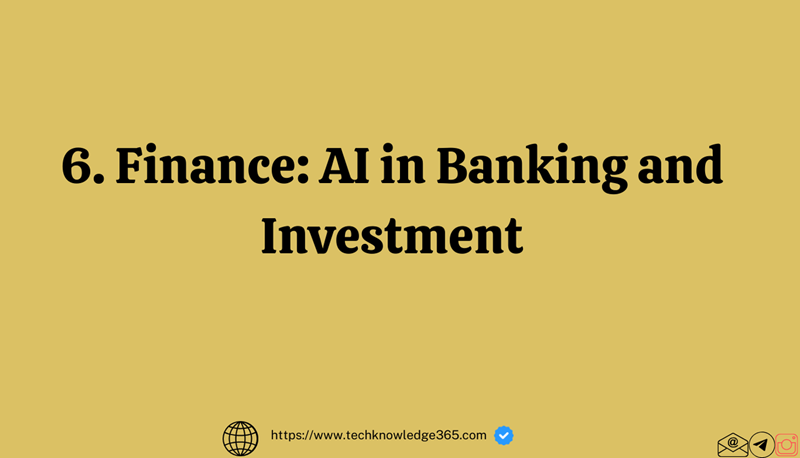
AI is transforming the financial sector, making services like banking, investing, and insurance more accessible and efficient. Automated systems powered by AI are able to analyze vast amounts of data to offer personalized advice on saving, budgeting, and investing. For instance, robo-advisors use algorithms to provide users with investment recommendations tailored to their financial goals and risk tolerance.
In banking, AI-powered chatbots handle customer queries and assist with transactions 24/7. AI is also improving fraud detection by analyzing patterns in financial transactions and flagging suspicious activity. Credit scoring systems, now enhanced with AI, offer a more accurate assessment of a person’s creditworthiness by considering a broader range of factors, beyond just credit history.

AI is increasingly integrated into the workplace, automating routine tasks and enhancing productivity. Many industries are already utilizing AI to automate repetitive tasks such as data entry, document management, and customer support. AI-powered software can streamline operations, reduce human error, and free up employees to focus on more creative or complex tasks.
Collaboration tools powered by AI are improving workplace communication. For example, AI-driven scheduling assistants can organize meetings by analyzing participants’ availability and preferences. Project management platforms use AI to predict project timelines, identify bottlenecks, and allocate resources effectively.
Moreover, AI is assisting with recruitment and talent management. HR departments use AI to screen resumes, match candidates to job openings, and even assess personality traits through AI-driven interviews, streamlining the hiring process.
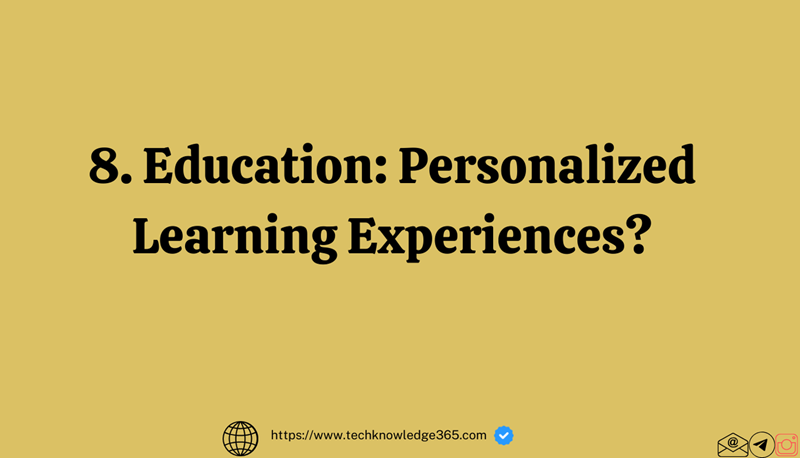
AI is also transforming the education sector by offering more personalized learning experiences. AI-powered platforms can assess students’ strengths and weaknesses, adapt lesson plans to their needs, and provide instant feedback. These systems allow for customized learning at an individual pace, benefiting students who need extra support or those who are ready to move ahead.
Furthermore, AI can help automate administrative tasks for educators, such as grading assignments and managing student records. This reduces the burden on teachers and allows them to focus more on the interactive and creative aspects of teaching.

While the role of AI in everyday life is largely positive, there are several challenges and ethical considerations that must be addressed. One of the most pressing issues is data privacy. AI systems often require large amounts of data to function effectively, which raises concerns about how personal data is collected, stored, and used.
Additionally, as AI becomes more integrated into society, there is growing concern about its impact on jobs. Many tasks that were once performed by humans are being automated, leading to potential job displacement in certain sectors. Ensuring that workers are trained for new roles and that the benefits of AI are distributed fairly will be crucial for addressing these challenges.
Conclusions
AI’s role in everyday life is vast and continues to expand across various sectors. From enhancing our homes and shopping experiences to transforming healthcare, transportation, and the workplace, AI is becoming an integral part of how we live, work, and play. While challenges such as data privacy and job displacement must be addressed, the potential benefits of AI are undeniable. As AI technology advances, its presence in our daily lives will only grow, making our world smarter, more connected, and more efficient.
See more..

About Author:
Hello, I’m md ghulam ahmad, and I’m the founder of techknowlwdge365.
I’ve always been passionate about writing, and in college, I wrote a lot of content for my school’s website. After graduating, I pursued that passion professionally by creating content for small businesses.
I love what I do because it allows me to use my writing skills in a way that is directly applicable to people’s lives. My clients are all so grateful for the work that I do for them, and I feel so lucky every time someone tells me how much they appreciate my work.
I look forward to hearing from you!



Good
thank you for your concern